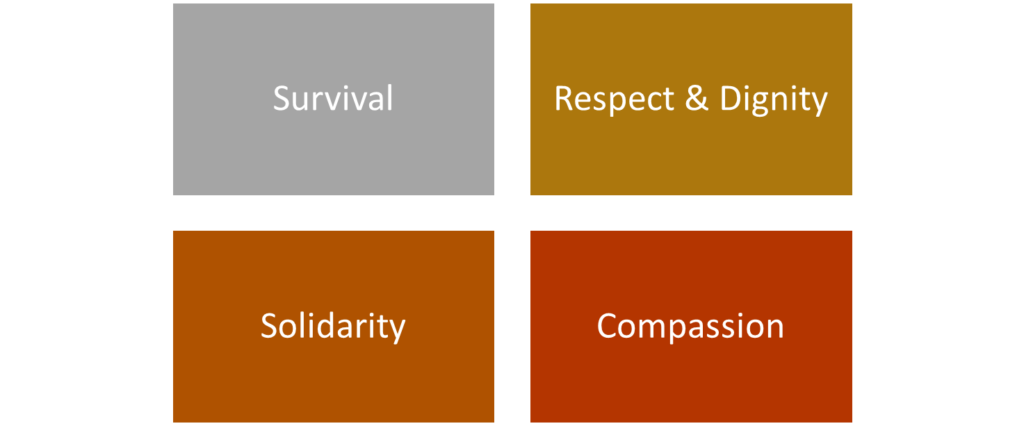In Humentum’s latest webinar in the Operationalizing Locally Led Development series, Faye Ekong joined our panel to explore leadership through a global lens and how to build organizations that are equitable, resilient, and accountable.
Over the past decade, our perceptions, structures, and engagements with work have transformed significantly. Now we seek purpose, belonging, and authenticity in our professional lives. Organizations encouraging us to express our complete selves at work are increasingly appealing. Key aspects such as flexibility, autonomy, and work-life balance have become integral to job satisfaction. In my perspective, the drive to perform meaningful work transcends mere financial compensation or job titles.
In light of this, the conventional Employee Value Proposition (EVP) seems outdated, with growing emphasis shifting towards a more people-centered approach known as the Human Deal, allowing for deeper connections and engagement at work. This change resonates especially in today’s globalized, interconnected world. A diverse and dispersed workforce challenges the one-size-fits-all leadership models and traditional Western-centric management theories, which now seem counterproductive.
So, what does a people-centered leadership approach entail? Where can we find insights to guide us in this evolving work landscape?
Rethinking leadership and management in the informal sector
This blog delves into leadership insights from an Afro-centric and African humanism perspective. Despite Africa’s significant role as the fastest-growing continent with the youngest population, it often remains overlooked in global management and leadership literature. Yet, Africa’s informal sector, which dominates employment across Sub-Saharan economies, offers a unique lens into vibrant ecosystems thriving without formal strategic plans, a “Theory of Change,” GANTT charts, accountability frameworks, formal organigrams, extensive organizational policies, or complex organizational structures.
Simultaneously, very few individuals involved in the various informal sector trades hold certificates in leadership, monitoring and evaluation or project cycle, procurement, finance, or people management to name just a few. Let alone advanced tertiary education degrees from prestigious internationally acclaimed institutions.
The informal sector’s success challenges our traditional beliefs about leadership and management. How does this sector operate so effectively? What guiding philosophies influence its interactions? Can these principles be applied to formal organizations across the continent and beyond? And which deeply engrained leadership models does the sector invite us to reflect on?
The essence of Ubuntu leadership
African humanism may offer some answers. Rooted in African societies’ cultural values, traditions and norms, African humanism underscores the importance of human dignity, co-existence, social harmony, and community. Perhaps the most well-known of African humanist philosophies is that of Ubuntu. Ubuntu, meaning humanity or “I am because you/we are,” emphasizes interconnectedness. Though originally associated with the South African Apartheid era, the concept, ethos, and essence of Ubuntu can in fact be recognized across the continent and is found in many of our African languages.
Ubuntu management or Ubuntu as a leadership philosophy promotes a more people-centered approach to work, leadership, and management. Its core tenets include:

Let’s looks at each of these four tenets a bit closer:
Survival – Our ability to forge ahead and keep going despite difficult times. It implies a deep sense of resilience and grit as well as care and concern for others.
Leadership example: In most countries across Sub-Saharan Africa, the informal sector was largely operational during the recent COVID-19 pandemic. With no ability to work from home, remotely, or engage via video conferencing, the only option for survival was to forge ahead despite the challenges and obstacles presented.
Simultaneously, during the pandemic, many organizations and employees from traditional sectors relied on workers and businesses in the informal sector to supply us with day-to-day goods and services. As leaders, how do we learn from this and encourage similar resilience and grit into our teams during periods of uncertainty, change, transition, or restructuring?
Respect & Dignity – Our ability to value the worth of others. It implies a willingness and ability to interrogate biases, stereotypes, assumptions, and a sense of humility to practice inquiry before judgement.
Leadership example: A myriad of trades and interactions take place irrespective of age, gender, religion, ethnicity, and other markers in the informal sector. Advice and input are genuinely sought from across the board, and networks and relationships are built on mutuality, without the need for detailed policies and multi-step formalized procedures. As leaders engaged in DEIB (Diversity, Equity, Inclusion, and Belonging) efforts and/or the complexities of dealing with a multi-generational workforce many pertinent questions arise.
To what extent are our policies and procedures creating an enabling environment versus just ensuring we are ticking a compliance or organizational box? Do we have people at the table to color or diversify the room or because we genuinely value and respect their inputs and perspectives even if they significantly deviate from our own or the accepted norm?
Solidarity – Our ability to transcend the “self” in favor of the collective. It implies a capacity for self-awareness, challenging extrinsic motivation and practicing courage over comfort.
Leadership example: informal sector has an uncanny yet impressive way of coming together, showing an almost impenetrable front of unity in the face of adversity, inequity, or unfairness. Vendors, suppliers, and individuals from various industries will often stand together foregoing their own benefits or profits to ensure collective well-being while supporting one another during challenging times. This solidarity fosters a strong community that prioritizes mutual aid and cooperation over individual gains, highlighting strength and resilience.
As leaders, it is important that we honestly engage in introspection and dialogue with our fellow leadership teams. We must question to what extent we consciously or unconsciously promote a multi-tiered organizational system. Specifically, when it comes to compensation, benefits, promotions, access to exposure, learning and growth opportunities, and other elements throughout the employee life cycle that benefit a few at the expense of the majority.
Compassion – Our ability to understand and have empathy for the challenges of others. It implies an impetus and commitment towards wanting to help and support within the confines to which a relationship has been built.
Leadership example: In both the informal and formal sector across the continent, there’s a natural inclination to support colleagues, peers, fellow vendors, or suppliers during important life events such as funerals, weddings, and other meaningful moments. This support, which can be financial or non-financial, takes various forms such as supplies, time, networks, contacts, expertise, and guidance. All this takes place intuitively and automatically without organizational policies stipulating the contribution amounts, days off, the nature of events that will be organizationally sanctioned, etc. It is a self-organizing ecosystem grounded in compassion, kindness, empathy, and togetherness. As leaders, how do we make more intentional efforts towards fostering genuine compassion within our organizations and among teams, even in the absence of formal organizational policies and procedures?
In conclusion, as leaders who reflect on and envision the future and global nature of work, we are all called to balance multiple dynamics in our organizations. The question is not so much about how we can effect a drastic transformation but rather what is one thing we can start doing today in the spirit of Ubuntu that can positively impact on our organizations and teams?
Over the last several years, the sector has continued to grow and evolve, and conversations around operationalizing locally-led development are here to stay. During this time, individuals, organizations, and networks across our sector have contributed fresh, alternative narratives on traditional approaches. Join us as we examine how new narratives will impact the sector now and in the future.

